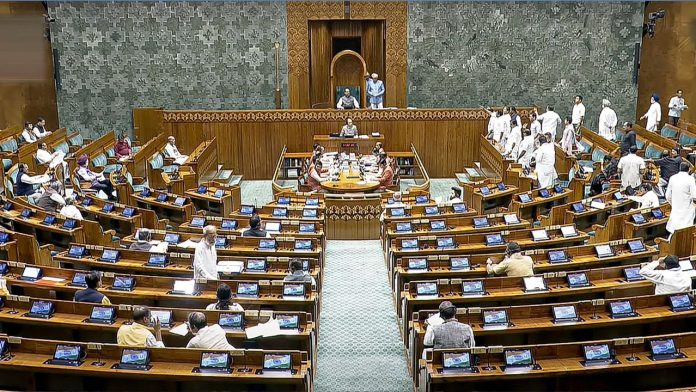DH NEWS SERVICE
New Delhi, Apr 4
Parliament’s nod to the Waqf (Amendment) Bill rendering it the government’s most consequential piece of legislation in its third term, and the political heat it generated inside and outside the legislature defined the second half of the Budget session which ended on Friday.
Punches and counterpunches between the ruling BJP-led NDA and opposition INDIA bloc, which showed signs of common purpose during as the session drew to a close, ran through the sitting that saw more than 100 per cent productivity in both Lok Sabha and Rajya Sabha.
Debates scored over disruption in this session during which 16 bills were approved by the two Houses and the President’s rule in Manipur received Parliament’s nod during post-mid night discussions in both chambers.
Parliamentary Affairs Minister Kiren Rijiju told reporters that the productivity of Lok Sabha during the session, which began with an address by President Droupadi Murmu on January 31 and ended on Friday with a recess from February 14 to March 9, was 118 per cent and that of the Upper House 119 per cent.
He said history was created and old records broken in Rajya Sabha when it sat without a break for 17:02 hrs from 11 AM on Thursday to the early hours on Friday to debate and pass the Waqf bill besides endorsing President’s rule in Manipur.
He noted that a live discussion on the bill was seen in both Houses without any disruption and occasional exchanges of sarcasm and banter.
After both the ruling National Democratic Alliance and the opposition INDIA bloc voted along the party lines on the bill, Rijiju said a similar pattern in polling was witnessed in Rajya Sabha save for “conscience” voting by some members, which boosted the strength of the treasury benches.
However, if the BJD’s decision to allow its members to vote according to their conscience was a shot in the arm for the BJP, Tamil Nadu’s AIADMK went with the INDIA bloc in opposing the bill at a time when the regional party is in talks with the ruling party for an alliance in Tamil Nadu.
Rijiju claimed that the bill would have got many more votes if opposition parties had not issued whips and allowed their members to vote according to their choice as many such MPs expressed “support” to him privately.
In Rajya Sabha, the Bill got 128 votes in favour and 95 against, while the score was 288-232 in its favour in the Lok Sabha.
With Congress slamming Speaker Om Birla’s criticism of former Congress president Sonia Gandhi, a Rajya Sabha member, for her claim that the Bill was bulldozed through Parliament after Rijiju raised the issue in the House, the minister defended the move saying her charge was totally unfounded when the two Houses debated extensively and allowed voting on opposition-sponsored amendments as well.
Asked about several opposition parties’ assertion that they will challenge the law in court, he said people are free to do so in democracy.
He also defended that the decision to take up the statutory resolution endorsing the President’s rule in Manipur in the early hours in both Houses, saying the business advisory committee had decided to discuss it after the debate on the Waqf (Amendment) Bill.
Besides the proposed law on reforming Waqf bodies, slammed as intrusion in the religious affairs of Muslims by the opposition, other important pieces of draft legislations to have received the approval of Parliament in the Session included The Finance Bill, Appropriation Bill, Immigration and Foreigners Bill,and Tribhuvan Sahkari University Bill.
Opposition parties sought to corner the government over issues ranging from economic distress, delimitation and three-language policy, while the government hammered its achievements like a growing economy, India’s stability amid global disruption and used the BJP’s political successes in assembly elections to claim popular endorsement.
If the discussion on the Motion of Thanks on the President’s Address with Prime Minister Narendra Modi replying in both Houses was the highlight of the Session’s first leg besides Finance Minister Nirmala Sitharaman record-breaking eighth consecutive budget, the government’s legislative agenda took over the second leg. With the Waqf (Amendment) Bill’s passage, the ruling BJP sent out the message that the setback following failure to win a majority in the national polls last year is history and that its ideological vigour and political determination remain undiminished.
It ensured that the contentious bill was passed by both Lok Sabha and Rajya Sabha with a comfortable majority, silencing the voices that felt it may go slow on the proposed law that united the squabbling opposition and drew murmurs of misgivings from its allies as well before they closed ranks behind the saffron party.



























